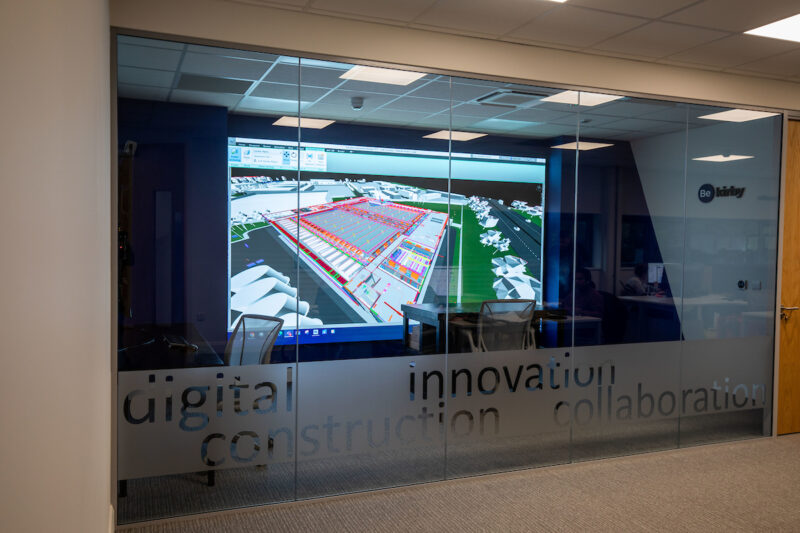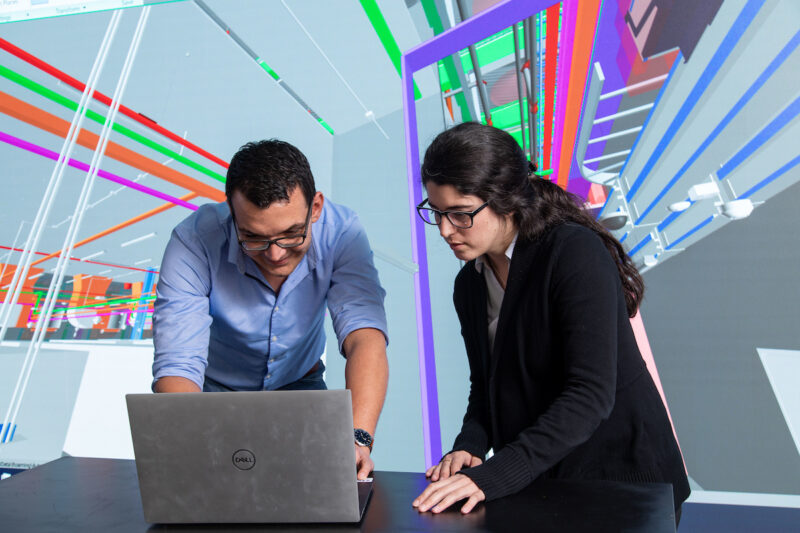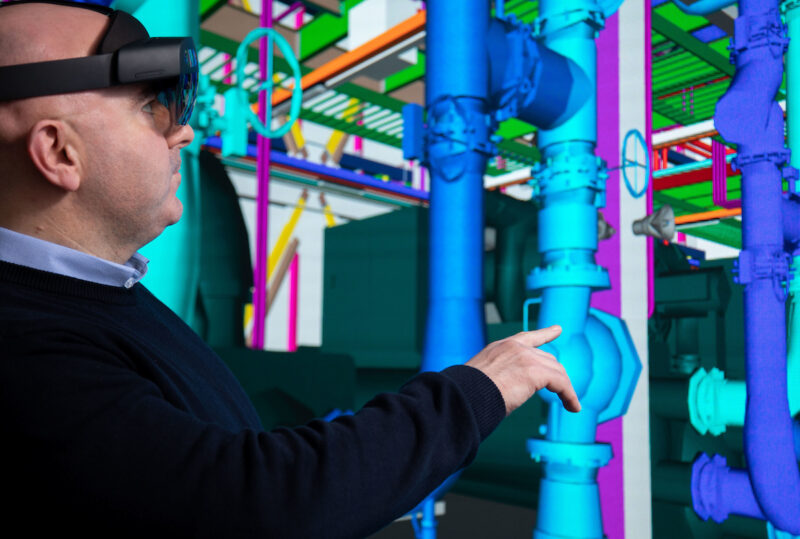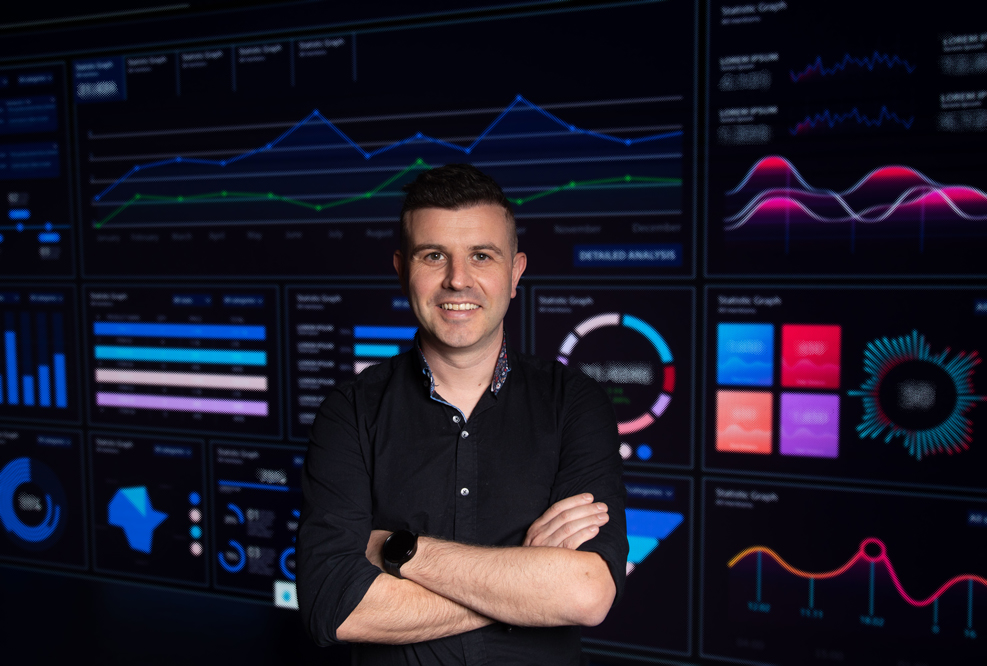Given that artificial intelligence is becoming a feature of almost all industries, Mark Danaher – Associate Director – BIM / Technical Services at Kirby, believes AI can be an integral part of the Kirby digitisation strategy, along with several other crucial strands that form the company’s bespoke three-year strategy to digitally transform its practices, which was launched earlier this year.
Irish Building Magazine speak to Mark Danaher, Kirby Group Engineering.
Digital transformation in the engineering sector has been happening at a rapid pace and Kirby was an early adopter of evolving features that could have a positive impact on its offering and streamline processes, not just for its own team, but for its clients too. To this end, the company has embarked on a strategy, which will culminate in the full digitisation of operations at all levels.
Mark believes, “In the short term, we see artificial intelligence (AI) as a useful way to offer the team enhanced IT support. In the longer term, it will have a very important role to play in predicting project outcomes and patterns based on existing data. The opportunities and benefits it can potentially offer are incredible.”
Mark and his team are heading up this large scale and ambitious transformation. During his 11 years at Kirby to date, he has already made huge strides in guiding the company on its digital journey. The three year plan incorporates elements including:
- The widespread rollout of specialised software to centralise all information and standardise processes for internal and external communications.
- The planning and creation of a data environment at Kirby that hosts all the company’s information.
- Implementing AI as an IT support system for staff, and as a means of predicting project outcomes and averting health and safety issues at site level.
- Further strengthening Kirby’s digital construction hub with improved and extended use of 3D modelling and augmented reality.
- Continuing the upskilling of staff in digital processes through the Kirby Academy.

Kirby has a long-standing partnership with Autodesk Construction Cloud (ACC), a construction software platform that enables users to track project progress in real time, which can be fed directly to management and stakeholders. Kirby is preparing to implement ACC on all of its projects, something Mark feels will greatly aid the streamlining of processes. “We’re aiming to drastically reduce our reliance on paper-based work, particularly in the on-site environment.
Our combination of tools including robotics and augmented reality, is allowing for greater connectivity between sites, as well as far more accurate geo-location of installations.
From now on this type of work can be done on devices and automatically uploaded to the cloud database. We’re at the start of this journey but the ultimate goal is that all documentation from text reports to RFIs (Requests for Information) to technical submissions will be standardised and processed this way, creating a shared space that can be accessed by senior management and that provides rapid communication with the client, a feature we know they value highly.”
“We have a lot of clients, particularly in the tech industry, who simply do not deal in paper anymore. By using digital processes, we are adding value to our proposition and giving the client what they’ve come to expect. Kirby senior management recognised the potential value of digitisation at an early stage and that level of support makes the process of introducing these practices easier, both in terms of our clients and across the board within the organisation,” Mark said.
Kirby is already an industry leader in the area of digital construction and 3D modelling, a position cemented with the installation of a digitisation centre of excellence at the company’s Limerick headquarters in 2021. The state-of the-art lab and instrumentation combine to support the work of 60 people and bring incredible insight into every minute detail of a project. This allows the Kirby team to offer additional assurance on quality and precision planning, saving time and money on-site. The firm’s investment in prefabrication and offsite manufacturing over the past twenty years also benefits from digital planning and preparation. Each of these factors reduces the number of hours spent on-site, lowers the risk of errors and accidents in unpredictable conditions and allows better control over component preparation and manufacturing.

Mark says these methods offer benefits to everyone involved in a project: “Using the most advanced software, we can carry out 3D modelling that can be shared directly with operators and stakeholders through digital hubs on construction sites. Our combination of tools including robotics and augmented reality, is allowing for greater connectivity between sites, as well as far more accurate geo-location of installations. The final result will be something we should all be working towards – far more efficient working practices and the best possible result for clients.”
The engineering sector has seen a dramatic skills and technology evolution in a relatively short period of time, and the onus is on companies operating within the sector to keep pace with these changes or risk being left behind. To this end, Mark says the Kirby Academy has been a vital tool in ensuring Kirby workers have the most up to date training levels. “Through the Academy, we run programmes that enable upskilling across all our processes. We enrol staff in courses, where they are then assessed and graded upon completion. This means we can have great confidence in the skill levels of our team, knowing they’re ready to take on a particular task or project in the way we need it to be done.
As the digital element of engineering becomes further embedded in the industry, Mark believes the future talent pool is also expanding: “We find that new, younger hires pick up our processes very quickly because they tend to be so-called ‘digital natives.’ However, it can be a challenge to tap into that talent pipeline in the first place, because graduates and school-leavers might not quite realise that these days, engineering and tech jobs often go hand in hand. The changing face of engineering has opened the doors to huge swathes of very talented people, often with more digital backgrounds. We will be hoping to reach out to those who might not have previously considered companies like Kirby, and demonstrate to them that their advanced technical skills could be highly transferable to engineering.”

Kirby senior management recognised the potential value of digitisation at an early stage and that level of support makes the process of introducing these practices easier, both in terms of our clients and across the board within the organisation.
Kirby’s three year digitisation strategy involves a huge level of time, investment and commitment at a company-wide level, led by Mark and his team, with particular support from Group MD Mark Flanagan and Group Finance Director Derry McMahon. Mark Danaher has his sights set on an exciting future: “Ultimately, we want to create our own data environment, that hosts all information and that will sow the seeds for large-scale AI practices to be implemented across our operations. These ambitions won’t all be realised in the short term, which is why we’re rolling out our strategy over three years. Digital transformation of an organisation of the scale and reach of Kirby simply would not be possible without leadership and buy-in, and it’s this level of collaboration that makes these strategies successful.”
Mark Flanagan paid tribute to Mark Danaher’s vision: “Mark was the right person in the right place at the right time for Kirby when he began working on our digital programme. It’s very easy to get on board with someone’s vision when they show such passion and dedication to the plan. He has shown fantastic ability and leadership to be able to bring us to where we are today and I can’t wait to see what’s to come in the years ahead.”

